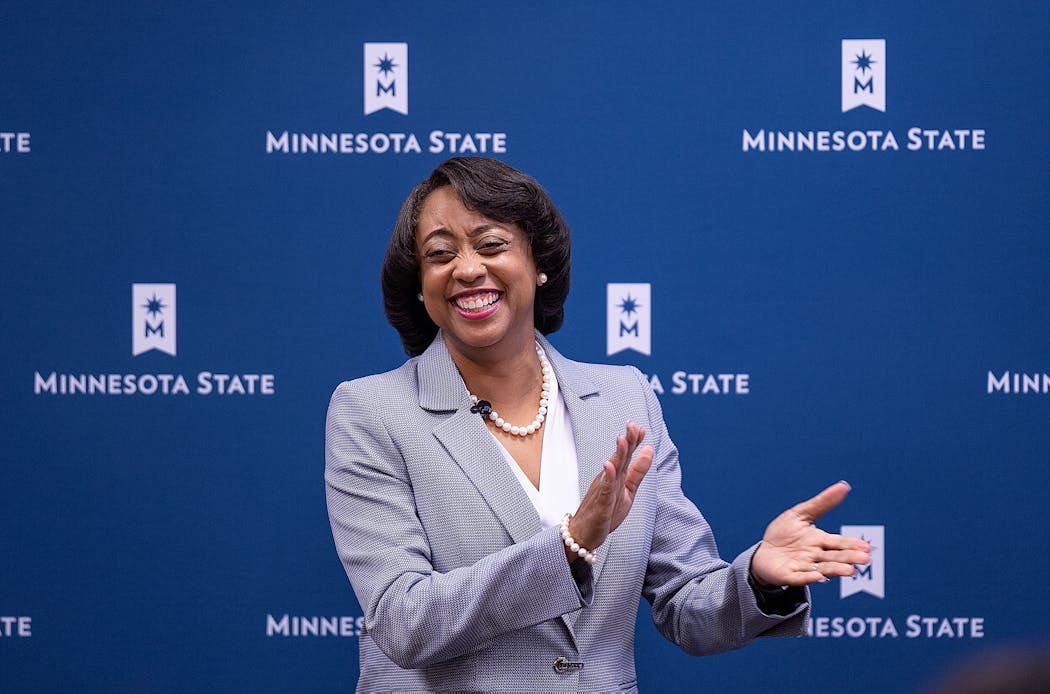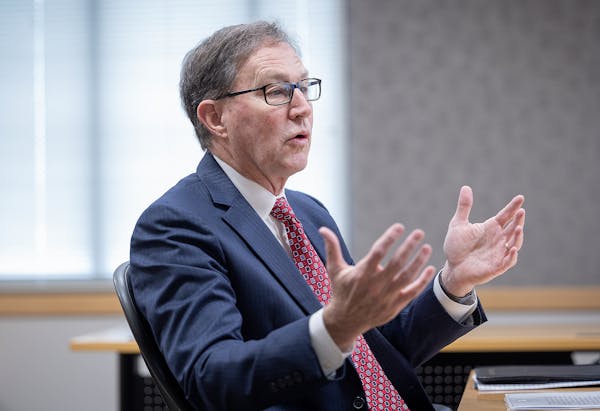The Minnesota State system of colleges and universities on Tuesday chose one of the system's presidents to serve as its next chancellor.
Winona State University President Scott Olson told trustees after the vote that he will work to make college more affordable and more accessible, with a goal of reducing racial and economic disparities in higher education.
"My family has prospered because of this system," he said, "but we can't rest until every family can say that."
The chancellor oversees a public system that has a roughly $2 billion budget and works with about 300,000 students across 33 colleges and universities. Trustees voted unanimously to select Olson over another finalist, Tonjanita Johnson, a high-level administrator in the University of Alabama system.
Board Chair Roger Moe said in a news conference Tuesday that he frequently heard from people who believed both finalists were strong, but that Olson's familiarity with the system's plans to promote equity and adopt new technologies set him apart.
"There was a sense that Scott was in a position to move — literally not miss a beat — between Chancellor [Devinder] Malhotra and his leadership," Moe said.
Malhotra began serving as the system's interim chancellor in 2017 and trustees decided to keep him in the role after twice rejecting candidates recommended by search firms. Malhotra announced in October that he intends to retire this summer.
Moe said trustees were pleased with the process to find Malhotra's successor, saying search firm Greenwood Asher & Associates spoke with more than 290 potential candidates, 33 of whom applied. Both Olson and Johnson appeared at a forum last month, where they fielded questions from students, faculty members and others with a stake in the system.
LeadMN, an organization that represents students at the system's two-year colleges, had supported Johnson, saying in a letter to trustees that she laid out a plan for developing "a clear working relationship with students," while it felt Olson's vision for the system "relied heavily on leveraging existing relationships rather than presenting a new collaborative relationship."
The group on Tuesday congratulated Olson and said it looks forward to "building a higher education system that works for every Minnesotan."
The Inter Faculty Organization, which represents 4,000 professors, coaches and counselors at the system's universities, declined to endorse a candidate before the meeting.
Jenna Chernega, the group's president, overlapped with Olson on the Winona State campus for seven years, during which they often sorted through difficult issues such as labor grievances and discipline proceedings.
"He recognized everyone's humanity, even when difficult decisions had to be made," she said, describing him as someone who always conveyed that he was listening and cared.
Olson will face pressure from students, faculty and state lawmakers to reduce the cost of college, reverse enrollment declines and promote equity and inclusion at a time when the pool of prospective students is becoming both smaller and more diverse.
On Tuesday, Olson expressed a willingness to tackle those issues. "We know what the work is," he said, calling his appointment the second greatest honor in his life, behind marrying his wife, Kelley.
Olson has spent the last 20 years working in the Minnesota State system, starting as a provost and vice president for academic and student affairs at Minnesota State University, Mankato, and becoming president of Winona State University in 2012.
Before coming to Minnesota, he was a dean at Ball State University in Muncie, Ind., and a director of graduate studies at Central Connecticut State University in New Britain, Conn.
It wasn't immediately clear how long Olson's term will last or how much he will be paid. The trustees' vote on Tuesday cleared the way for the system to wrap up negotiations with him. Malhotra's base salary is $420,000, and he also receives $117,000 per year in allowances for housing, transportation, professional development and other costs, plus the benefits that are also available to other system employees.
Johnson, who was not at the meeting, could not immediately be reached. She has worked since 2019 as a senior leader in the University of Alabama system, which has more than 70,000 students, and before that worked in higher education systems in other states.

Want to share info with the Star Tribune? How to do it securely

'Safe recovery sites' would offer syringes, naloxone and more to people using drugs. The plan could be in peril.
New Minnesota GOP leaders seek peace with party's anti-establishment wing

Who is Republican Lisa Demuth, Minnesota's first House speaker of color?



